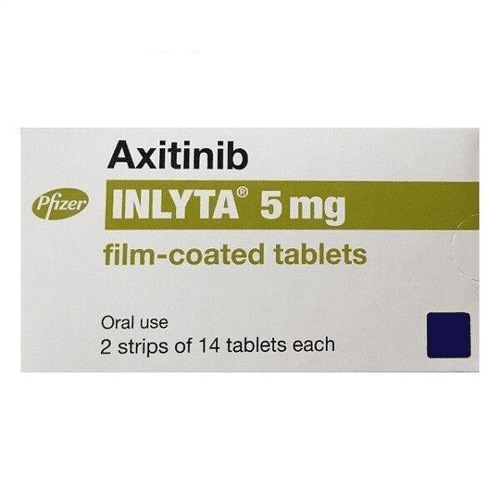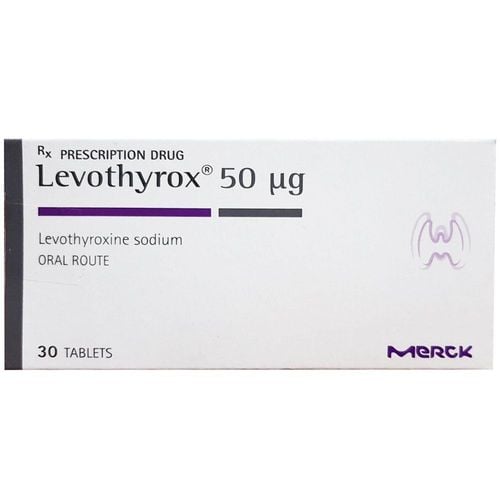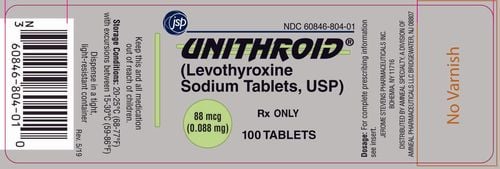This is an automatically translated article.
Caprelsa (Vandetanib) belongs to a class of Tyrosine Kinase inhibitors (TKI), commonly used to treat thyroid cancer with drugs (medullary form). To ensure the best effect of the drug, the patient needs to follow the instructions of the doctor or pharmacist.1. What disease does Caprelsa treat?
Caprelsa (also known as Vandetanib) is used to treat thyroid cancer. The drug works by slowing or stopping the growth of cancer cells in the body.
2. How to use Caprelsa
Caprelsa is most effective when taken by mouth (with or without food), 1 dose per day. Accordingly, the patient should swallow the drug whole, do not crush or break the tablet, do not touch the dust or powder of the drug because the drug can be absorbed through the skin and lungs and harm the fetus. Women who are pregnant or suspect to be pregnant also avoid taking and exposure (touching, breathing) to dust from this medicine. If contact is made, wash the area thoroughly.Dosage of Caprelsa will be prescribed by the doctor depending on the patient's health condition and ability to respond. Maintain the correct dose to maximize its benefits and effectiveness.

Bệnh nhân ung thư tuyến giáp được kê đơn thuốc Caprelsa
3. Side effects of the drug Caprelsa
When taking Caprelsa, in some cases patients may experience the following side effects:
Nausea and vomiting. Change in appetite, loss of appetite. Dry mouth Stomach pain. Diarrhea. Depression. Headache or blurred vision. Hypertension . Nail problems (swelling, pain, nail infection). Mild skin reactions (rash, acne, dry skin, mild itching). Temporary hair loss (will grow back when the medication is stopped). If any of these reactions persist or tend to get worse, contact your doctor as soon as possible. If you have persistent, severe diarrhea or vomiting, your doctor may need to check your blood mineral levels and adjust the dose of Vandetanib you use.
In addition, if you experience the following serious side effects, seek medical help immediately:
Redness, pain in the palms of your hands or soles of your feet. Signs of heart failure (difficulty breathing, unusual tiredness, unusual weight gain). Signs of an underactive thyroid (such as weight gain, cold intolerance, slow heart rate, constipation, unusual tiredness). Sudden shortness of breath, cough or fever (watch out for signs of rare interstitial lung disease). Headache, seizures, vision changes, confusion (beware of serious brain problems). Signs of bleeding (vomiting blood, vomit that looks like coffee grounds, black or bloody stools). Signs of a stroke (weakness on one side of the body, slurred speech, sudden vision changes, confusion).

Trầm cảm là một tác dụng phụ do thuốc Caprelsa gây ra
4. Notes when using Caprelsa
Before taking Caprelsa, tell your doctor or pharmacist if you have the following conditions:
Have ever had an allergic reaction to the drug or any of its ingredients. Kidney problems, high blood pressure, recent bleeding (including coughing up blood). Caprelsa can cause blurred vision, obstructing vision, so users should not drive or operate machinery at a time when clear vision is required. Besides, the drug Caprelsa also makes the user's skin more sensitive to the sun. Therefore, it is recommended to limit time in the sun, use sunscreen and wear protective clothing when outdoors.
Before surgery tell your doctor in advance about all the medicines you are taking.
Older adults may be more sensitive to the side effects of this drug, especially long QT syndrome. Because Caprelsa can be absorbed through the skin and lungs, causing harm to an unborn baby, women who are pregnant or suspect to be pregnant should not use this medicine or avoid breathing in the dust from the tablet.
Tell your doctor if you are pregnant or plan to become pregnant. It is not recommended that you become pregnant while using Caprelsa because it can harm the unborn baby. Your doctor may ask you to take a pregnancy test before ordering this medication. Women and men taking Caprelsa should ask about reliable forms of birth control during treatment and for 4 months after stopping treatment. If you are unlucky to get pregnant while taking this medicine, talk to your doctor about the risks and benefits of this medicine.
It is not known whether Caprelsa passes into breast milk. Because of the risk of adverse effects on the neonate, this drug is not recommended while breastfeeding and 4 months after stopping treatment.
You should also regularly check the electrocardiogram (ECG), measure the concentration of minerals (Calcium, magnesium, potassium) in the blood, check the thyroid function, measure blood pressure, have an eye exam to monitor the effectiveness of the treatment. medication or check for side effects (if any).
5. Caprelsa drug interactions
While taking Caprelsa, be careful with other drugs that also affect heart rate (QT prolongation syndrome) such as: Chloroquine, Amiodarone, Dofetilide, Disopyramide, Granisetron, Dolasetron, Haloperidol, Methadone, Pimozide, Moxifloxacin, Procainamide, Sotalol, Macrolide antibiotics (such as Clarithromycin).
Some other medicines you are taking may remove Vandetanib from your body, for example: St. John's wort, Dexamethasone, Rifamycins (such as Rifabutin, Rifampin), medicines used to treat seizures (such as Carbamazepine, Phenobarbital, Phenytoin, Primidon).
Therefore, to be on the safe side, you should tell your doctor all the medicines you are taking. In the event that Caprelsa overdose leads to overdose symptoms such as fainting, difficulty breathing, rash, diarrhea, high blood pressure, etc., you should immediately call 911 or go to a medical facility. nearest.
If you forget to take a dose of Caprelsa, if it is less than 12 hours, take the missed dose. If it is more than 12 hours, take the next dose at the prescribed time, do not take a double dose to make up for the missed dose.

Thuốc Caprelsa không được phép sử dụng quá liều
6. Storing Caprelsa
For the medicine to keep its effect, you need to store the medicine at room temperature away from light or moisture. Do not store medicine in the bathroom. Keep Caprelsa out of the reach of children and the reach of pets.
Users need to use Caprelsa drug exactly as prescribed by the doctor. If you experience unusual signs or unwanted side effects, the patient should immediately notify the doctor for timely intervention to avoid the risk of complications.
To ensure safety and monitor the condition of the disease after using the drug, patients should perform periodic health check-ups or follow-up appointments as prescribed by the doctor. At Vinmec International General Hospital, there are now a full range of tests and clinical examinations to check the patient's health status, monitor the time after using the drug of the patient. The entire examination and testing process at Vinmec is carried out by a team of experienced and qualified medical doctors and modern medical facilities, so it can give accurate results, helping doctors advice on the best treatment.
Please dial HOTLINE for more information or register for an appointment HERE. Download MyVinmec app to make appointments faster and to manage your bookings easily.
Reference source: webmd.com













